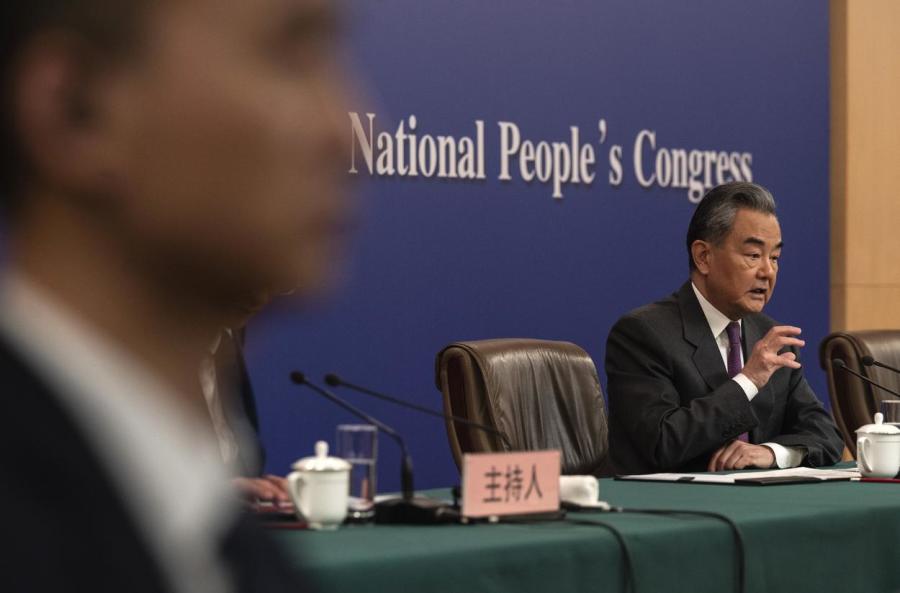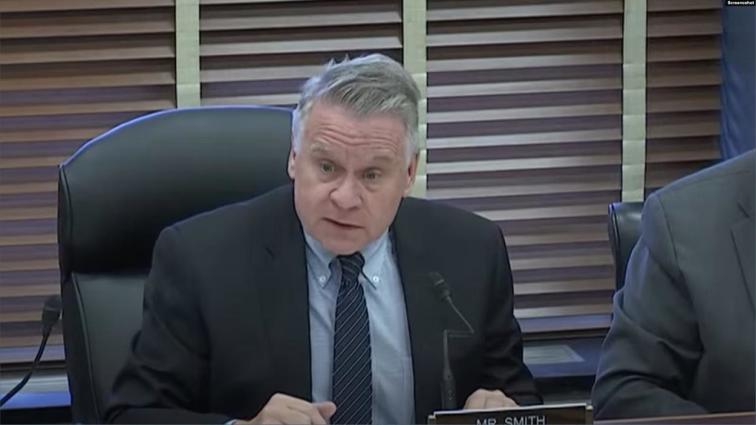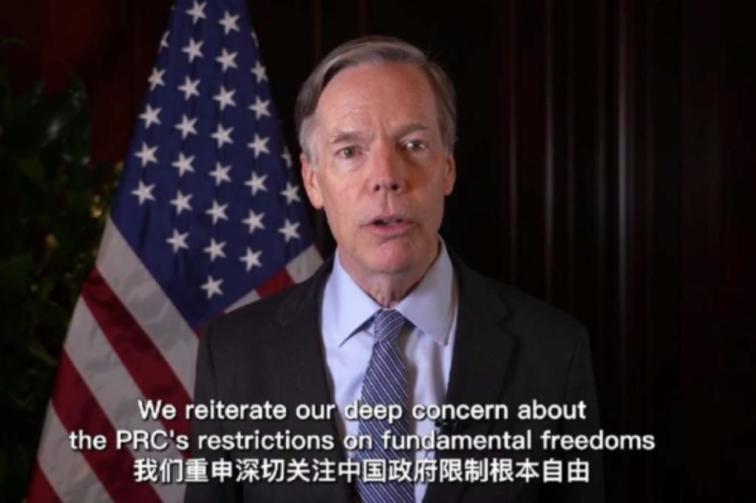File Photo: Chinese Foreign Minister Wang Yi speaks at a press conference for domestic and foreign journalists during the National People's Congress and Two Sessions held in Beijing, China, on March 7, 2024. (Photo by Kevin Frayer/Getty Images)
People News - On January 2, Chinese Foreign Minister Wang Yi unveiled the newly established Human Destiny Community Research Center in Beijing. Wang stated that building a "community of shared future for mankind" is a significant original idea proposed by Chinese Communist Party (CCP) leader Xi Jinping. Analysts suggest that the CCP aims to assert dominance on the global stage to replace the U.S.-led international order established after World War II. In reality, however, the Communist Party, known for its antagonism toward nature, humanity, and the divine, may be seeking to drag humanity into collective destruction amidst natural disasters.
The CCP's Ministry of Foreign Affairs reported on the unveiling ceremony and quoted Wang Yi as saying that the concept of a community of shared future for mankind highlights the CCP's original mission and purpose. At a press conference on January 3, Foreign Ministry spokesperson Mao Ning stated that this concept has transformed from a proposal into a consensus, from a vision into practice, and is now driving profound positive changes in the world.
But what is the CCP's "original mission"? How has it advocated and implemented this mission throughout its history?
When the Communist Party first emerged, its Manifesto explicitly outlined its mission: to violently dismantle the existing world, abolish nations, and rule all of humanity. The manifesto is riddled with phrases like "violence" and "destruction." In the subsequent practices of communist internationalism, the Paris Commune shattered Europe's rich civilization and arts, while violent revolutions proliferated. This continued with mass killings under Lenin and Stalin in the Soviet Union and later spread to China, where the CCP carried out a range of campaigns involving infiltration, warfare, massacres, and political persecution.
Since 1949, the CCP has launched campaigns such as the "Three-Anti" and "Five-Anti" movements, the Anti-Rightist Campaign, the Four Cleanups Movement, the Cultural Revolution, the Tiananmen Massacre, the persecution of Falun Gong starting in 1999, the cover-up of the SARS epidemic in 2003, and the crackdown on Hong Kong’s anti-extradition protests in 2019. Party culture glorifies the struggle against heaven, earth, and humanity. From altering nature and destroying Chinese culture to eroding morality and distorting human nature, and from corrupting Buddhism, Daoism, and Christianity to lying about the COVID-19 pandemic, the CCP has consistently pursued actions that lead to humanity's destruction.
Amid the current wave of natural disasters and human-made calamities, some insightful observers have pointed out that the CCP's opposition to divinity, morality, and the natural order will ultimately bring divine retribution.
What Exactly Does the CCP Envision for a "Shared Future for Humanity"?
Commentator Chen Pokong remarks, "China (under the CCP) sees itself as the world's second-largest economy and a superpower capable of standing shoulder to shoulder with the U.S. It therefore seeks to compete with the U.S. for global discourse dominance, proposing the concept of a 'community of shared future for mankind.' Essentially, it is an attempt to promote the so-called China (CCP) model."
The United States is a nation founded on Christian civilization, embracing universal values as a way of life. Traditional Chinese culture also values harmony. In contrast, the CCP is an organization rooted in the philosophy of struggle. Can it succeed in replacing the U.S. and dragging the world into its culture of conflict?
Chen Pokong further explains that the so-called "China (CCP) model" revolves around one-party rule, collectivism, a state-controlled system, and authoritarian governance. However, these ideas have limited acceptance internationally. For example, the CCP has tried to sell this concept to Vietnam, proposing a "China-Vietnam community of shared future." Vietnam, however, rephrased it as a "Vietnam-China future shared community," indicating uncertainty about the future. Ultimately, the idea became subject to differing interpretations. Only countries like Laos and Cambodia, which receive significant economic aid from China (CCP), have signed relevant agreements. Chen notes that the CCP has failed to sell this concept in ASEAN, BRICS summits, or Belt and Road forums, let alone gain acceptance from the U.S., Europe, or other Western countries.
"This is just Xi Jinping's one-sided rhetoric, as he imagines himself steering global development. In reality, it's wishful thinking," says Chen Pokong.
Political observers believe the "community of shared future for mankind" is nothing more than a façade. Through it, the CCP seeks to elevate itself as a divine force and portray Xi Jinping as a "great leader" on the world stage. This is evidenced by the establishment of various research centers centered on Xi Jinping's ideas, such as the Xi Jinping Diplomatic Thought Research Center, the Xi Jinping Economic Thought Research Center, and the Xi Jinping Cultural Thought Research Center, further entrenching personal worship. "The CCP's diplomatic thought is now tied to this 'community of shared future for mankind,' which essentially deifies Xi Jinping, akin to erecting another shrine for him. What the shrine contains doesn't matter," says Hu Ping, honorary editor-in-chief of the overseas political journal Beijing Spring in New York.
Wang Yi claimed that dozens of countries and regions are now working with China (under the CCP) to build various forms of shared futures. The concept of a "community of shared future for mankind" was first introduced by Xi Jinping during his visit to Russia in March 2013. The CCP has recognized that its traditional communist rhetoric has lost credibility; slogans like "Workers of the world, unite for a communist revolution" now provoke only disdain. In recent years, the CCP has actively promoted its "three global initiatives" internationally, seeking to rally other nations and vie for dominance in global relations. It seeks to challenge democratic nations with authoritarian rule and establish a new international order centered on totalitarian regimes. This raises the question: is the CCP aiming to reconstruct a "Communist International" to replace the current global order?
The CCP's Ministry of Foreign Affairs website, in a report titled Wang Yi on the Significance and Impact of the Community of Shared Future for Mankind, stated:
"Building a community of shared future for mankind reflects our Party's innate sense of internationalism, linking China's future and destiny closely with that of the world. It transcends differences in social systems and ideologies, as well as historical, cultural, and developmental disparities. It has set a banner and charted a course for China's major-country diplomacy with Chinese characteristics in the new era."
Netizens, however, argue that the underlying message is clear: the CCP aims to tie its destiny to the world under the guise of internationalism. When the CCP faces divine retribution, it intends to drag the world down with it.











News magazine bootstrap themes!
I like this themes, fast loading and look profesional
Thank you Carlos!
You're welcome!
Please support me with give positive rating!
Yes Sure!